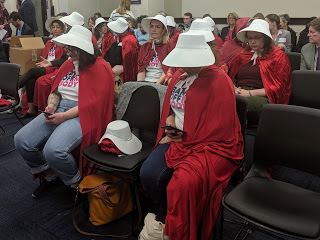Three anti-abortion bills advance out of legislative committees

Pro-choice advocates dressed as characters from “The Handmaid’s Tale” at the March 4 House Judiciary committee, which passed two abortion bills. (Photo by Melissa Patrick)
—–
Three abortion bills advanced in the legislature last week, one to give the state’s attorney general more power to enforce abortion laws, one to require fetal remains to be buried or cremated after the procedure, and one to give the state auditor power to audit reports about abortions.
House Bill 370, sponsored by Rep. Nancy Tate, R-Brandenburg, would require abortion providers to either cremate or bury aborted fetuses in a licensed funeral facility. Parents could also decide the final disposition of the fetal remains.
“The abortion provider currently has to provide for the disposal. This is merely directing respectful disposal as opposed to being incinerated with other medical waste,” Cathie Humbarger, an abortion opponent with Northeast Indiana Right To Life, told the House Judiciary Committee March 4.
HB 370 is similar to a 2016 Indiana law that was upheld by the U.S. Supreme Court last year.
No one spoke against the bills, though abortion-rights activists sat in the audience wearing white bonnets and red robes like characters from “The Handmaid’s Tale,” the dystopian novel and award-winning Hulu show in which women are treated as property of the state and forced to bear children.
The committee also approved House Bill 451, sponsored by Rep. Stan Lee, R-Lexington, would expand the power of Attorney General Daniel Cameron, an anti-abortion Republican, to regulate abortion facilities, including bringing injunction relief as well as civil or criminal penalties for violations.
Current law only allows the attorney general this power if it requested by the Cabinet for Health and Family Services, which licenses and inspects health facilities.
“Several committee members expressed concern about expanding these powers, with Rep. Maria Solaris, D-Louisville, asking about the potential for a “rogue attorney general.” Lee said the courts could handle such problems,” Deborah Yetter reports for the Louisville Courier Journal.
Cameron is the first Republican to hold the office since 1947, and “many of his staff members worked in former Republican Gov. Matt Bevin’s legal team, defending abortion restrictions in several high-profile legal battles and attempting to close the state’s only abortion facility,” Ryland Barton reports for Louisville’s WFPL.
Since taking office in December, Democratic Gov. Andy Beshear has ended the state’s licensure battle with abortion providers and allowed Planned Parenthood of Indiana and Kentucky to offer abortions in Louisville.
Tamarra Wieder of Planned Parenthood told Yetter that the group chose to remain silent after members were cut off from speaking at a recent hearing on another abortion bill, with the chairman saying the committee was out of time.
“Today was a statement about how we’ve been treated in the past,” said Wieder, the organization’s public affairs and policy director. “It’s a statement on the power grabs that are taking place around Kentucky on reproductive health.”
Kate Miller, with the American Civil Liberties Union of Kentucky, told Yetter afterward that her organization also opposes both bills as “a continuing effort to force every Kentuckian to stay pregnant against their will.”
 |
| State Auditor Mike Harmon and Rep. Stan Lee present Lee’s bill to let the auditor audit abortion reports. (Melissa Patrick photo) |
House Bill 391, also sponsored by Lee, would expand the state auditor’s powers to audit reports about abortions, including audits of whether facilities that perform abortions are following state requirements to report all abortions to the state Office of Vital Statistics.
It was approved March 5 by the House Health and Family Services Committee.
Yetter reports in a separate article that the bill prompted “heated debate, largely along party lines, about it’s true purpose.”
“Rep. Tom Burch, D-Louisville, questioned whether the measure is a Republican “method of harassing providers” by the party of Ronald Reagan, the president who argued for smaller government.
Lee said it is to ensure abortion statistics are being reported accurately, citing Reagan’s famous “‘trust but verify’ comment about nuclear disarmament with the former Soviet Union,” Yetter writes. Lee said, “I would like to think that this piece of legislation is verifying abortion providers who are taking the lives of unborn babies are complying with the law.”
Several Democratic women on the committee questioned why abortion clinics, already regulated by the health cabinet, would fall under the purview of the state auditor; one questioned why the auditor, whose main role is to ensure proper use of public funds, was being called to audit facilities that get no state money; another asked Lee and state Auditor Mike Harmon what other private entities his office investigates, and got no direct answer.
Yetter writes, “State law requires any facility where an abortion is performed to report information including the age, race and state of residence of the patient; age in weeks of the fetus; and the type of abortion, such as surgical or by medication. It does not include reporting any identifying information regarding the patient.”
An annual report required by law shows that 3,203 abortions were reported in Kentucky in 2018, 18 of them at hospitals and the rest at EMW Women’s Surgical Center in Louisville, the state’s only abortion clinic.
Jackie McGranahan of ACLU-Kentucky, spoke against the bill, saying she believed it was part of an effort “to make abortions inaccessible to all Kentuckians.”
This prompted Rep. Robert Goforth, R-East Bernstadt, to suggest strongly that McGranahan violated the oath she took to tell the truth before testifying. When McGranahan tried to reply, Goforth cut her off more than once before saying “That’s your opinion.”
Tamarra Wieder of Planned Parenthood, told Yetter that the bill is part of an ongoing effort by the legislature to erode reproductive rights and to expand authority over abortion. “It is a chilling prospect for the future of abortion in Kentucky,” she said. At least eight anti-abortion bills are being considered in this legislative session.